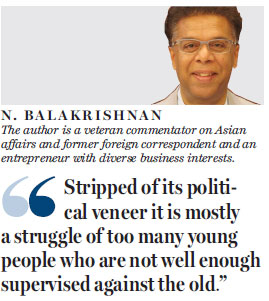The elderly and the young should work together more
Updated: 2016-02-03 08:27
By N. Balakrishnan(HK Edition)
|
|||||||||
The two biggest expenditure items of the Hong Kong government are education and health. Education expenditure is spent mostly on the young and the health expenditure is spent mostly on the old. It is estimated that world-wide about 60 percent of the money spent on a person is spent during the last two years of a person's life, as we vainly attempt to prolong someone's existence.
But with some imagination and rearrangement of these two categories of expenditure, education and health, we may be able to make life better for the old while they are active and alive, rather than only when they are bed-ridden.
When I was visiting Hawaii recently, I was pleasantly surprised to find that in that state people above the age of 60 are allowed to "audit" all courses in all publicly funded universities in Hawaii - something that we really should be considering seriously for our own senior citizens in Hong Kong.
For those who are not familiar with the nomenclature of US universities, to "audit" means you can attend classes and listen and participate, but you will not be asked to do the "papers" and the professor will neither mark the papers nor give you a grade. It is intellectual enlightenment without the pressures of having to write papers to deadline and worry about the grades. Perfect for a cultivated older gentleman or lady bluestocking - what more can one ask for!
I found out another interesting bit of information while talking to some of those who have taught "audit" courses, where many senior citizens were present. The presence of the senior citizens in the classroom changes the cultural dynamic of the course, especially during discussions, when the seniors with more experience and longer memories contribute. Whereas many of the young students might have been only toddlers when the Berlin Wall fell, the seniors would have watched it on television. So it is not just the seniors but also the young students who benefit from the discussion cutting across generational lines. So everyone wins when "diversity" comes in, particularly some of our know-it-all aggressive student activists.
As far as I know no such schemes exist in Hong Kong, where the universities - funded to the tune of billions from the public purse - cater mostly to those under 30 years old. When you think about it logically it is indeed a form of "ageism" or age discrimination.
As Hong Kong changes rapidly into a city with more and more seniors, some of whom are wealthy landlords and many of whom are not, the educational institutions might have a vital role to play. The wealthy elite can benefit from courses on appreciating the opera or on "spirituality" or even join "light" physical activities such as yoga at the gym.
The "elderly poor", and unfortunately the majority of the people fall into this category, can be taught simple computer skills that will allow them, for example, to pay their electricity and gas bills online rather than by having to line up for a long time to pay them at the nearby post office. When I walked into the General Post Office in Central recently to send a "speed post" item, I noticed that the line for "Paythru" counters was longer and had many more people than those waiting to use the usual postal services of buying stamps and registering letters.
Since the Hong Kong Post loses money, what this means is that in one way or another the post office is subsidizing inefficient and expensive paper-based channels for paying utility bills. This is because no one has bothered to teach old people how to use computers and make online payments.
Bringing seniors onto Hong Kong campuses may help solve one more peculiar Hong Kong problem. We have seen a lot of "student activism" on Hong Kong campuses recently, pitting many fit young men and women with volatile temperaments against the hapless senior citizens of the "administration".
Stripped of its political veneer it is mostly a struggle of too many young people who are not well enough supervised against the old! On the other hand, if enough seniors were hanging around classrooms and student canteens, and reasoning with the young students before problems exploded in the public domain then perhaps, just perhaps, we might have more peaceful campuses. Peace and enlightenment for both the young and old.

(HK Edition 02/03/2016 page10)